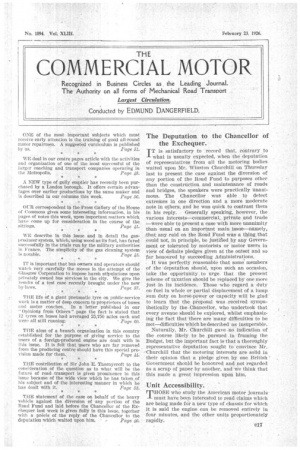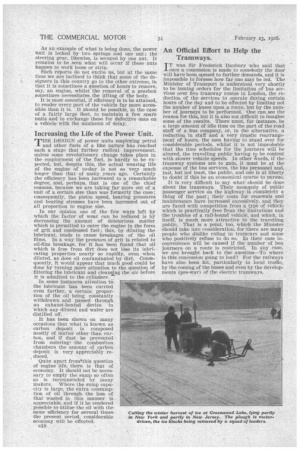The Deputation to the Chancellor of • the Exchequer.
Page 1

Page 2

If you've noticed an error in this article please click here to report it so we can fix it.
TT is satisfactory to record that, contrary to -Iwhat is usually expected, when the deputation of representatives from all the motoring bodies waited upon Mr. Winston Churchill on Thursday last to present the case against the diversion of any portion of the Road Fund to purposes other than the construction and maintenance of roads and bridges, the speakers were practically unanimous. The Chancellor was able to detect extreines in one direction and a more moderate note -in others, and he was quick to contrast theta in his reply. Generally speaking, however, the various interests—commercial,, private and trade --wereableAo present a case with more unanimity than -usual on .an important main issue—namely, that any raid on the Road Fund was a thing, that could not, in principle, be justihed by any Government or tolerated by motorists or motor users in view of definite pledges given at the outset and so far. honoured by succeeding Administrations.
It was perfectly reasonable • that some members of the deputation should, upon such an occasion, take the opportunity to urge that the present scheme of taxation should be replaced by one more • just in its incidence. Those who regard a duty on. fuel in whole or partial displacement of a lump sum duty on horse-power or capacity will be glad"' to learn' that the proposal was received sympathetically by the Chancellor, who undertook that every avenue should be explored, whilst emphasizing the fact that there are many difficulties to be met—difficulties which he described as insuperable.
Naturally, Mr. Churchillgaveno indicatiOn of the course likely to be pursued in framing the Budget but the important fact is-that a thoroughly representative deputation sought to convince Mr. "Churchill that the motoring interests are solid in their opinion that a pledge given by one British Government should be honoured and not regarded as a scrap of paper by another, and We think that this 113ade a great impression upon him.
Unit Accessibility.
THOSE who study the American motor journals mink have been interested to read claims which are being made for 'a new type of chassis for which it is said the engine can be removed entirely in four minutes, and the other units proportionately rapidly.
'As an example of what" is being done, the power unit is locked by two springs and one nut; the steering gear, likewise, is secured by one nut. It remains to be seen what will occur if these nuts happen to work loose or strip.
Such reports do not excite us, but at the same time we are inclined to think that some of the designers in this country go to the other extreme, in that it is sometimes a question of hours to remove, say, an engine, whilst the removal of a gearbox sometimes necessitates the lifting of the body.
It is most essential, if efficiency is to be attained, to render every part of the vehicle far more accessible than it is. It should be possible, in the case of a fairly large fleet, to maintain a few spare units and to exchange these for defective ones on -a vehicle with the minimum of delay.
Increasing the Life of the Power Unit.
']"HE DESIGN of power units employing petrol_ 1and other fuels of a like nature has reached such a stage that further radical improvement, unless some revolutionary change takes place in the employment of the fuel, is hardly to be expected, but, despite this, the actual wearing life of the engine of to-day is not so vety much longer than that of many years ago. Certainly the efficiency has been increased to a remarkable degree, and, perhaps, that is one of the chief reasons, because we are taking far more out of a unit of a certain size than was formerly the case; consequently, the piston speed, bearing pressures and bearing stresses have been increased out of all proportion to engine size.
In our opinion one of the • few ways left by which the factor of wear can he reduced is by decreasing the amount of deleterious matter which is permitted to enter the engine in the form of grit and condensed fuel; this, by diluting the lubricant, tends to cause breakages of the oil films. In a way the presence of grit is related to oil-film breakage, for it has been found that oil which is free from dirt does not lose its lubricating properties nearly so rapidly, even when diluted, as does oil contaminated by dirt. Con*quently, it would appear that much good could be done by turning more attention to the question of filtering the lubricant and cleansing the air before it is admitted to the cylinders. In some instances attention to the lubricant has been carried even farther, a certain proportion of the oil being constantly withdrawn and passed through an exhaust-heated device in which any diluent and water are distilled off.
It has been shown on many occasions that what is known as carbon deposit is composed mostly of matter other than carbon, and if dust be prevented from entering the combustion chambers the amount of carbon deposit is very appreciably reduced.
Quite apart froinsthis question of engine life, there is that of economy. It should not be necessary to empty the sump so often as is recomniended by many makers. Where the sump capacity is large, the extra consumption of oil through the loss of that wasted in this manner is appreciable, and if it be rendered possible to utilize the oil with the same efficiency for several times the present neriod, considerable economy will be effected.
e18
An Official Effort to Help the Tramways.
TT was Sir Frederick Banbury who said that -I-once a concession is made to somebody the door will have been opened to further demands, and it is impossible to foresee how far one may be led. The Minister of Transport is understood very shortly to be issuing orders for the limitation of bus services over five tramway routes in London, the reduction of the services to operate during certain hours of the day and to be effected by limiting not the number of buses upon a route, but by the number of journeys to be performed. One can see the reason for this, but it is also not difficult to imagine some of the results. There must, for instance, be a large amount of idle time on the part of the road staff of a bus company, or, in the alternative, a reduction in staff and a very drastic rearrangement of hours, the men having to stand over for considerable periods, whilst it is not improbable that the time schedules for the journeys will be altered, the travelling public having to be content with slower vehicle speeds. In other words, if the tramway systems are to gain, it must be at the expense of the bus services, the bus personnel and, last, but not least, the public, and one is at liberty to doubt if this be an economical course to pursue.
It is very difficult to say what should be done about the tramways. Their monopoly of public passenger service on the highway is completely a thing of the past ; their costs for renewals and maintenance have increased excessively, and they are faced with competition from a type of vehicle which is practically free from the limitations and the troubles of a rail-bound vehicle, and which: in itself, is much more attractive to the travelling public. That is a point, too, which the Minister should take into consideration, for there are many people who dislike riding in tramcars and Some who positively refuse to do so. In their case inconvenience will be caused if the number of bus journeys on a route is restricted. In any case, we are brought back to the question—To where is this conCession going to lead? For the railways have also been hit, particularly in local traffic, by the coming of the buses and even by the developments (pre-war) of the electric tramways.






























